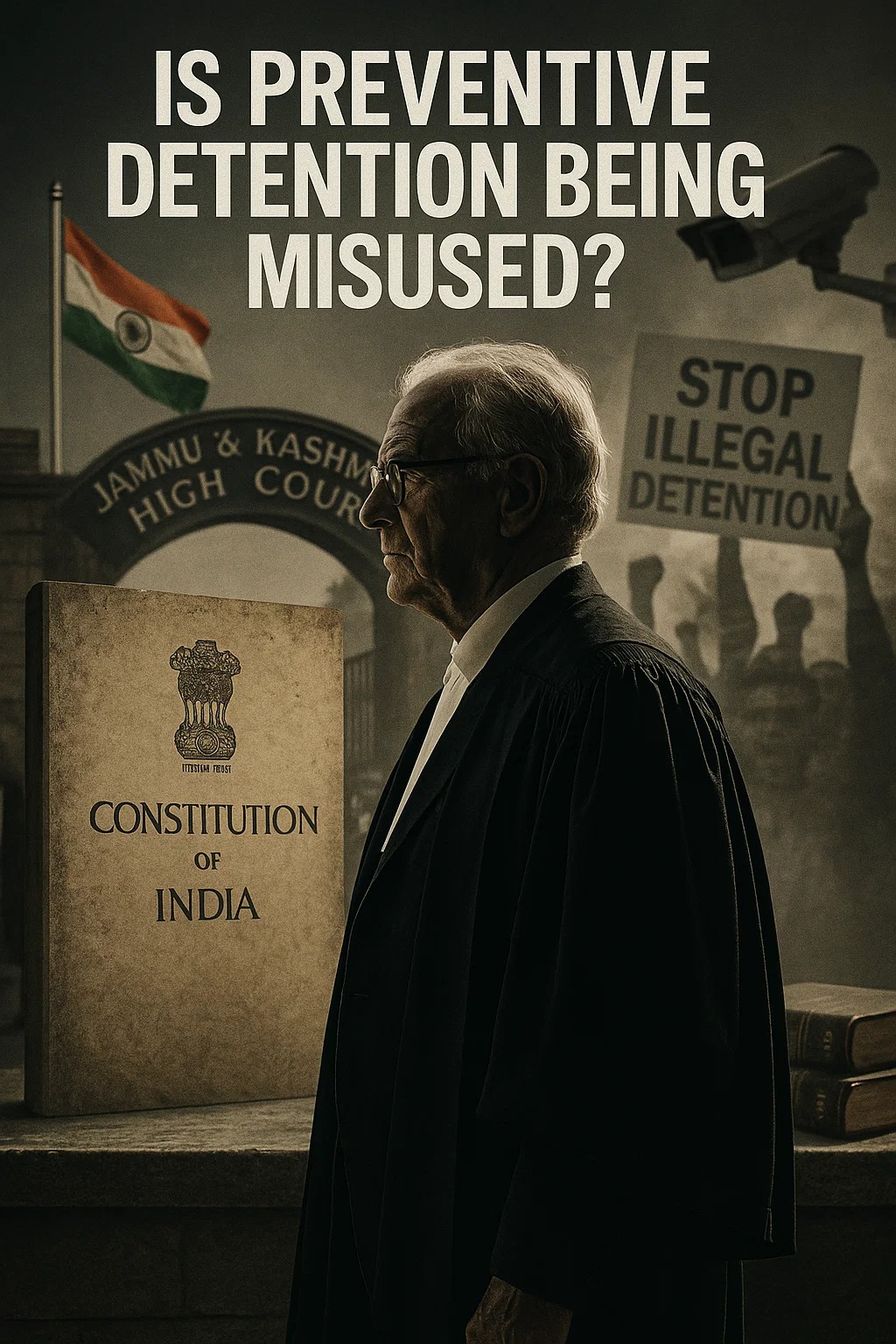INTRODUCTION
In a landmark judgment the Jammu & Kashmir and Ladakh High Court recently quashed the preventive detention of Advocate Muhammad Ashraf Bhat a 71-year-old advocate it was held that the detention was illegal as per the ‘procedural pitfalls’. The detention was made under the Public Safety Act (PSA), 1978, reigniting debates about the thin line between national security and individual liberty.
The detention was held by the police stating that the petitioner’s practice was prejudicial for the state’s security. Petitioner had the hardcore activist secessionist ideology which was very close to the secessionist organisation, and also aided in the protest. The PSA, Jammu & Kashmir Public Safety Act, allows for detention without trial for up to two years in the interest of public order and national security, which is different from that of the Preventive Detention Under Article 22 of the Indian Constitution in Part III i.e, under the Fundamental Rights.
Preventive Detention is when someone is arrested for a crime that they have not committed but might commit. Normally, in normal right, it is for three months, except as per the procedure established by law. Preventive Detention law is treated as vague, arbitrary in nature cause there is no legal backing for the person’s detainment. The case of Advocate Bhat stands as a clear example of such concerns.
The Case at Hand
Activist Muhammad Ashraf Bhat was arrested under PSA on charges of alleged participation in activities prejudicial to the maintenance of public order. But when questioned in the High Court, the bench discovered a number of procedural and substantive flaws in the detention order. Above all, the court stressed that suspicion or previous behaviour cannot be the basis for preventive detention unless there is a real, imminent threat.
The court emphasized the need for proper exercise of mind by detaining authorities. In Bhat’s case, authorities had acted on stale FIRs and general allegations without making a connection between his conduct and any current or future threat. Additionally, the court held that procedural protections under Article 22 of the Constitution including timely communication of reasons of detention and the right to present a representation had not been properly complied with.
Legal and Constitutional Dimensions
The verdict puts into sharp relief the provisions of Articles 21 and 22 of the Indian Constitution. While Article 21 ensures the right to life and liberty, Article 22 stipulates protection against arbitrary arrest and preventive detention, such as the right to be given reasons for arrest and the right to be defended by a lawyer.
The “subjective satisfaction” doctrine, usually cited by powers to approve preventive detention, cannot trump constitutional guarantees. The court reaffirmed that detention orders have to be grounded on objective material and due process not speculation.
A Warning Against Abuse
The court called preventive detention a “double-edged sword” able to safeguard society but also able to violate fundamental freedoms if abused. This ruling is a firm reminder to state authorities that national security cannot be invoked as a blanket reason to restrict civil liberties without firm legal support.
Why This Matters
Advocate Bhat’s cases aren’t only about personal freedom; they challenge India’s constitutional democracy to be as strong as possible. The role of the judiciary is crucial here in making sure that executive authority, particularly when it comes to detention without trial, is under control.
As the court astutely observed, “A democratic society cannot remain democratic unless it remains vigilant.” The scales of liberty and security must always swing in favour of freedom except when the danger is real, imminent, and legally established
ABOUT THE AUTHOR
Nitya Jain is a law student at Symbiosis Law School, Pune, and an emerging legal writer with a keen interest in constitutional and contract law. Backed by a strong academic foundation, she actively engages with contemporary legal issues through research, writing, and in moot court competitions. A certified legal researcher by Manupatra, Nitya aims to contribute valuable insights on pressing legal matters through her work.

